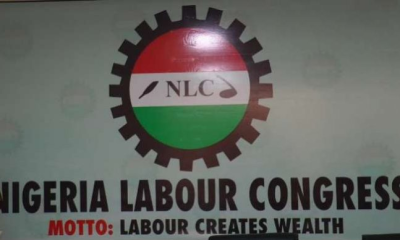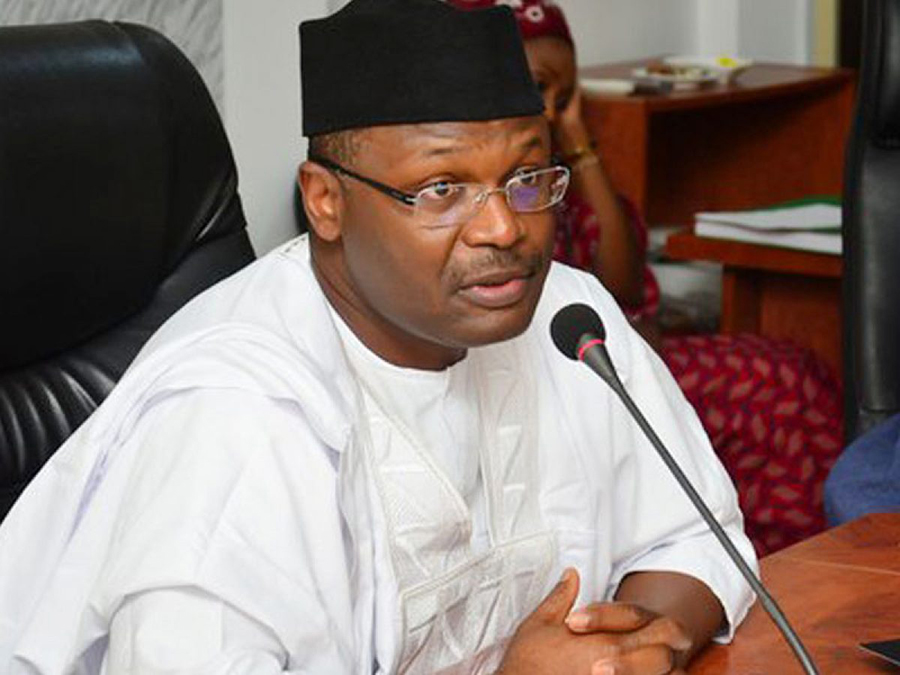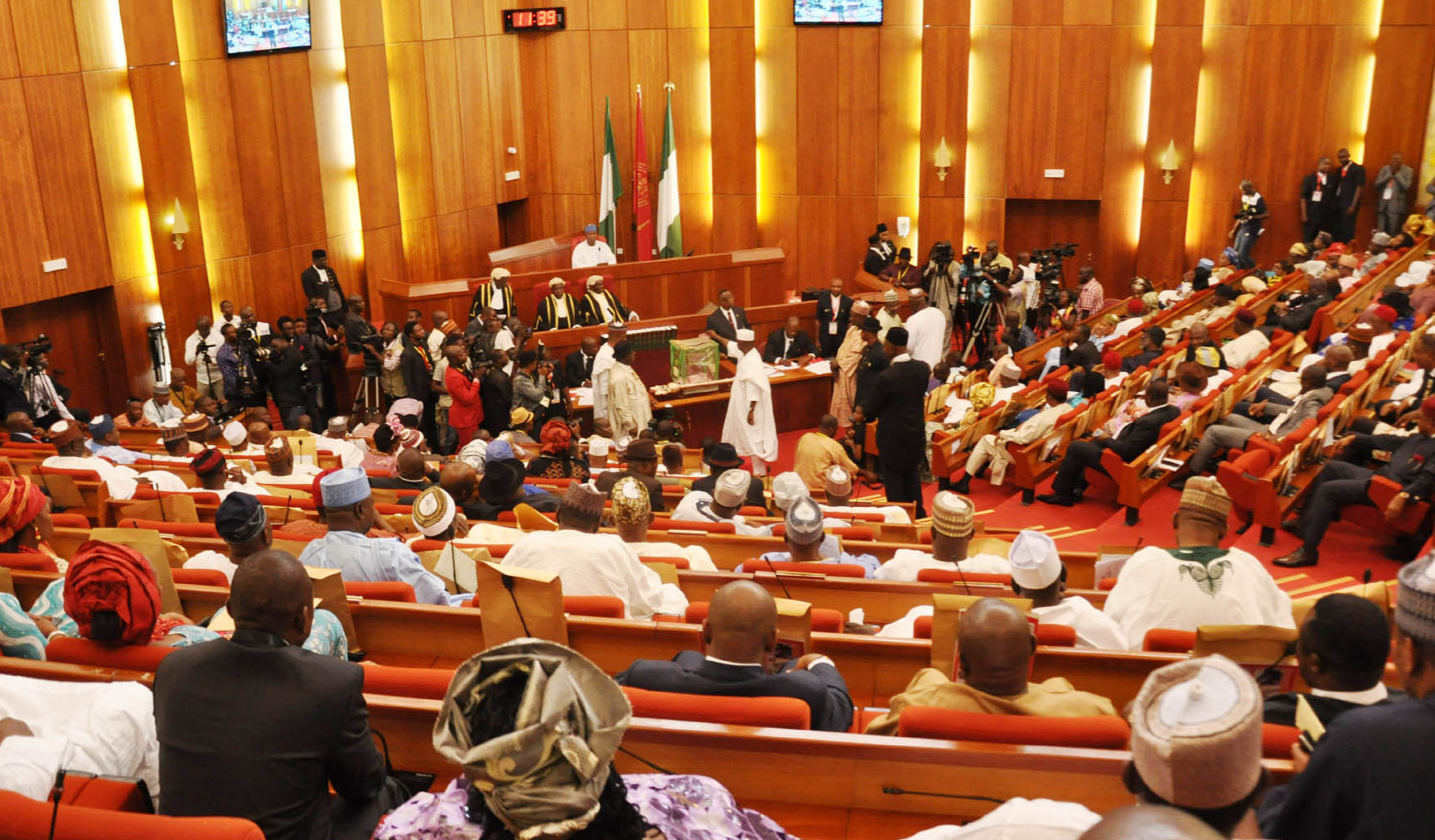News
Breaking: Protesting Sports Festival Contingents Block Major Road, Say ‘We Have No Food, No Allowance’
Published
4 years agoon
By
Editor
Protesting contingents of the aborted 2020 National Sports Festival otherwise known as Edo 2020, Thursday, March 19, blocked the popular Ekewan road, Benin City.
Ekewan road is the major road that links Ekewan barracks, Ekewan, Evboutubu, Ugbiyouko, Asoro, Agho and other areas of Benin metropolis.
The protest, though peaceful, led to the blocking of Joromi to Agho junctions portion of the road, as vehicular movement were restricted, exposing commuters who are going back to their homes after the day’s job to untold hardship.
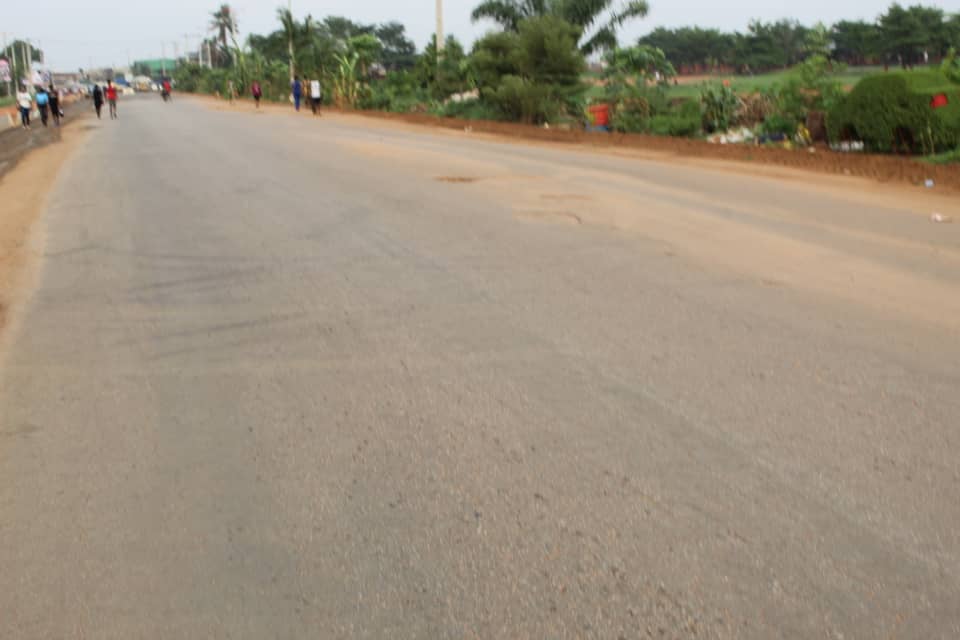
The ever busy Ekewan road deserted by motorists as a result of the protest
Speaking to Info Daily in an exclusive chat, one of the contingents who does not want his name mentioned, said they decided to show their grievances over negligence on the side of the authorities concerned.
READ ALSO: Bauchi Govt To Establish Three Isolation Centres On Lasser Fever
The contingent who claimed majority of the persons who were peaceful protesting are staff of the Edo State Sports Council, revealed that they ( the contingents) have been camped for the past two weeks without allowance, good care.
“You see, majority of the persons you’re seeing here are members of the Edo State Sports Council. The National Sports Festival has been postponed, good and fine but what about our allowances. We have been camped for the past two weeks in preparation for the sports festival but let me tell you that we have not been paid a single day allowance; we are not taken good care of.
“Take for insurance, since morning, we have not been given food; no money. Since they camped us here, they don’t care if we exist”, he said.
READ ALSO: Just In: FG Slashes Petrol Price
He therefore called on the authorities concern to pay their allowances and other fringes they are entitled to.
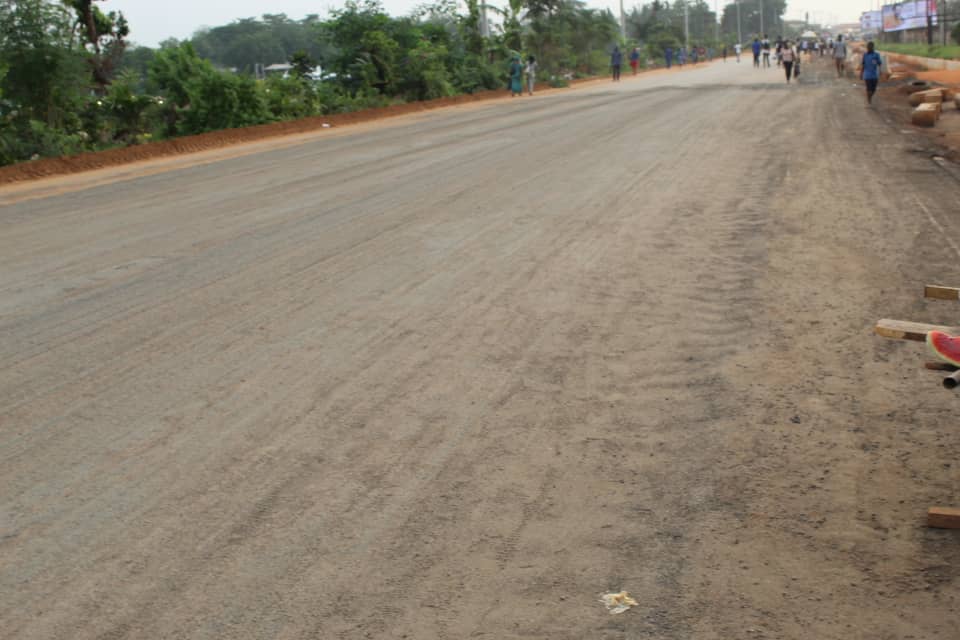
The ever busy Ekewan road which under construction (dualization) by the Obaseki govt turned ghost of itself because of the protest.
“We cannot be here for the past two weeks without anything. Is it because the sports festival has been suspended we will not be paid for the weeks we have been here? They should pay us our two weeks allowance. Most of us have family, so we can’t leave our homes for good two weeks without anything.
Speaking to Info Daily on phone on the protest, Edo State
commissioner for Sports and Youth, Damian Lawani, said he is not aware of such protest, adding that he needed to contact the state Deputy Governor whom according to him is in charge of the sports festival.
READ ALSO: Cheating Husband Infected With Coronavirus After Taking Mistress To Italy
“Well, I am not aware of such protest to the extent of blocking major road. I will actually need to contact the Deputy Governor to know the real story. He is in charge so I need to hear from him to confirm”, he said.
You may like


FULL LIST: Those Supporting, Against Aug 1 Nationwide Protest


DSS Warns Against Planned Nationwide Protest, Identifies Sponsors


Planned Protest: Tinubu Holds Emergency Meeting With Sultan, Ooni, IGP, Others


We’re Not Part Of Any Protest – Bauchi NLC


Church Members Protest, Disown Faction Promoting LGBTQ Rights


BREAKING: SGF, NSA, Ministers In Emergency Meeting Over Planned Nationwide Protest
News
FULL LIST: Those Supporting, Against Aug 1 Nationwide Protest
Published
6 hours agoon
July 26, 2024By
Editor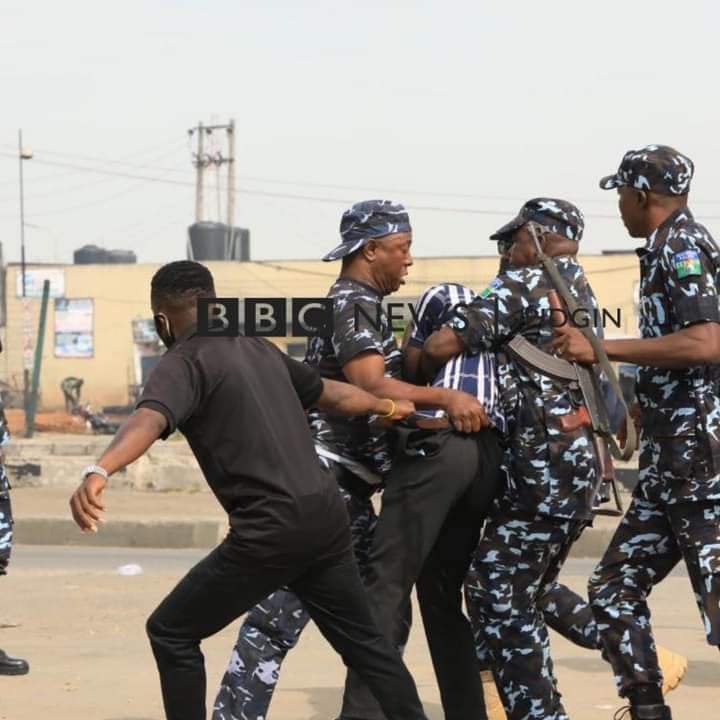
It is no longer news that some Nigerians are planning to march against economic hardship under the ‘EndBadGovernance’ protest from August 1 to 10.
The demonstration, which is gaining traction on social media, has been scheduled to be held across all states of the Federation as well as the Federal Capital Territory, Abuja.
However, its organisers have remained largely anonymous as no group has come forward to take responsibility.
The August 1 protest comes on the heels of similar demonstrations in Kenya, from which experts say Nigerians may have drawn inspiration.
Kenyan youths staged massive protests for weeks, forcing President William Ruto’s government to backtrack on tax hikes.
Organisers used social media platforms like X (formerly Twitter) and Instagram to mobilise millions of young Kenyans for protests — a similar strategy deployed on Nigerian social media space.
READ ALSO: Act Fast On Oil Spill Rocking Forcados Area, CSOs Task FG, Delta Govt
In October 2020, Nigeria experienced massive protests nationwide when thousands of young people demonstrated against police brutality.
As the hunger protest movement gains momentum, with thousands of youths set to take action, national and state authorities have warned the organisers to tread softly.
Meanwhile, human rights lawyer, Inibehe Effiong has revealed that participants in the planned nationwide protest would receive free legal representation if arrested and/or charged to court in Lagos State.
Citing the loss of life and property that characterised the #EndSARS protest in the country, many stakeholders, CSOs, bodies and others have pleaded with the organisers to shelve their plan, adding that the issues raised by them were already being addressed.
In the same vein, leaders from the southern and northern parts of the country have also joined the government to oppose the protest.
State governors have also cautioned against the protest, saying it is potentially dangerous.
READ ALSO: DSS Warns Against Planned Nationwide Protest, Identifies Sponsors
As part of moves to placate aggrieved citizens, the President sent a bill to raise the minimum wage from N30,000 to N70,000 to the National Assembly this week. Both chambers of the legislature speedily passed the bill on Tuesday, awaiting the President’s assent.
So far, here is a list of those who are against, or supporting the planned protest as complied by The Nation
AGAINST
Executive Director, Citizens for Development and Education, Ibrahim Waiya
Controversial singer Portable
Christian Council of Nigeria (CCN)
Enugu Innovative Youths
Orji Kalu
Institute for Peace and Conflict Resolution
Northern Ethnic Youth Group Assembly
Kebbi State Government
Lagos State House of Assembly
SDP’s Adewole Adebayo
READ ALSO: Presidency, Obi Trade Words Over Planned Hardship Protest
Citizens for Development and Education (CDE), Ambassador Ibrahim Waiya
Arewa Concerned Citizens Forum
Southern Kaduna People’s Union (SOKAPU)
Confederation of All Progressives Congress (APC) Support Groups (CASG)
Arewa Youth Assembly
South-East Governors’ Forum
Minister of the Federal Capital Territory, Nyesom Wike
Femi Fani-Kayode
Members of the House of Representatives agreed to donate 50 per cent of their salaries for a period of six months.
Ogun State Governor Dapo Abiodun
Coalition of Concerned Civil Society Organizations (CSOs) in Kaduna state
Trade Union Congress of Nigeria (TUC)
Chieftain of the All Progressives Congress, Uche Nwosu
National Council of Traditional Rulers
Governor of Jigawa State, Umar Namadi
National Association of Nigerian Students in Lagos
Self-Reliance for Physically Challenged Traders of Nigeria
Chairman of Tantita Security Services Nigeria Limited, High Chief Government Ekpemupolo (Tompolo)
READ ALSO: Planned Protest: Tinubu Holds Emergency Meeting With Sultan, Ooni, IGP, Others
Rising Up for a United Nigeria (RUN) and Coalition of Civil Society Groups for National Stability and Cohesion
Actor Lege Miami
Door-to-door Youth and Women Initiative for Good Governance
Reno Omokri
Middle Belt Forum, MBF, Kaduna State chapter
Executive Director, Business Development of the Nigerian-Export Import Bank (NEXIM) , Hon Stella Okotete
National Association of Nigerian Students (NANS)
Christian Association of Nigeria (CAN)
170 members of the House of Representatives under the aegis of the “New Dawn Caucus – 10th Assembly”
Jama’atu Nasril Islam
Oba of Benin, Oba Ewuare II
SUPPORTING
Atiku Abubakar
The leadership of the Social Democratic Party led by National Chairman, Shehu Gabam
All Workers Convergence (AWC) led by Comrade Andrew Emelieze
Ayo Adebanjo-led faction of Afenifere
Lagos State Chapter of the Active Citizens Group Nigeria led by the group’s state coordinator, Adamma Ukpabi
Omoyele Sowore
Amnesty International
UNDECIDED
National Youth Council of Nigeria (NYCN) directed its 104 affiliate organizations to remain on standby.
NATION
News
Religious Leaders Harp On Tolerance At Grassroots Sensitisation Programme In Benin
Published
9 hours agoon
July 26, 2024By
Editor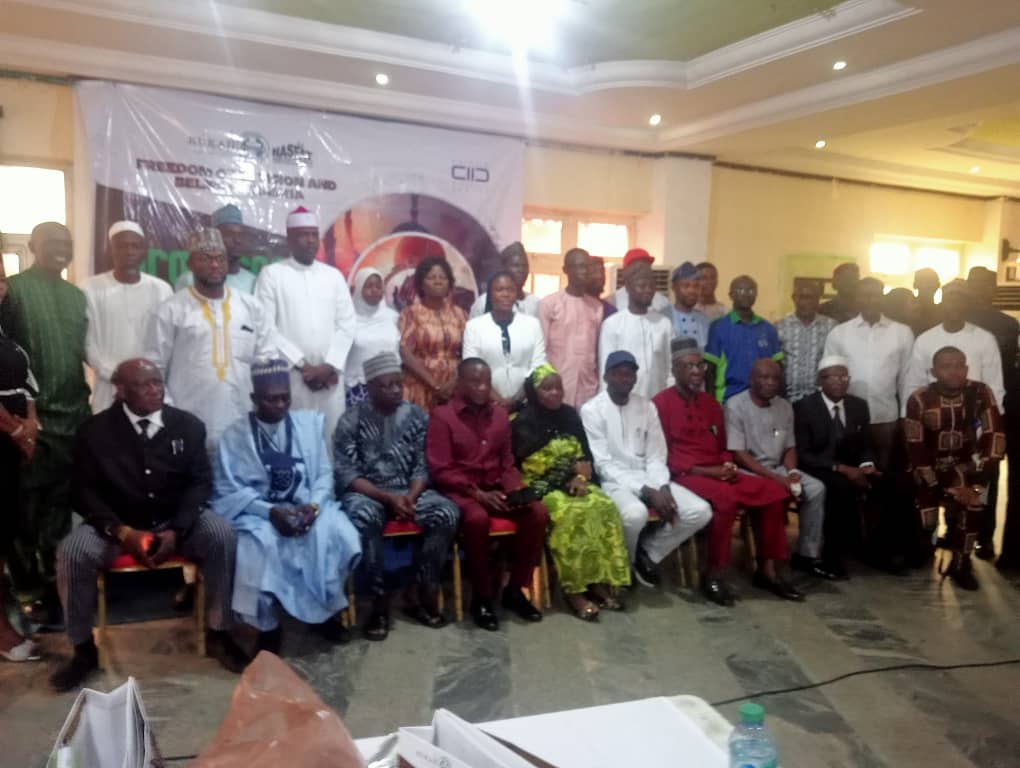
By Joseph Ebi Kanjo
The need for religious tolerance in Nigeria took the centre stage in Benin on Friday at a Grassroots Sensitisation Programme on survey report on Freedom of Religion and Belief (FORB) in Nigeria.
The programme, themed
MECHANISM TO MONITOR FREEDOM OF RELIGION AND BELIEF IN NIGERIA, was implemented by the National Human Rights Commission (NHRC); the Kukah Center (1KC) and Nasrul-lahi-l-Fathiu
Society (NASFAT), while King Abdullah ibn Abdulaziz International Center for
Interreligious and Intercultura Dialogue (KAICIID) provided the fund.
In her opening remarks, Project Coordinator, FORB, Hajia Halimat Oyedele, said the project aimed at increasing the level of coexistence and the opportunity for peace in the country, and also addressing the existing structural limitations.
She added that the project also aims at the “promoting changes to existing policies in order to ensure existing laws and mechanisms promote social cohesion and the respect of Freedom of Religion and Belief.”
READ ALSO: Obasanjo Makes Shocking Revelation About His Birth
She continued: “In addition, to prevent possible future violations, the project will also focus on spreading a culture of respect of difference through targeted awareness raising activities on Interreligious Dialogue (1RD) and the respect of Freedom of Religion and Belief.
“This will increase the level of tolerance of the population and, hence, the possibility for peaceful coexistence between communities.”
On his part, keynote speaker, Barrister Nurudeen Asunogie, while stating that all the major religions in Nigeria preache justice, stressed: “Religion preaches justice. You can’t take everything because you think you are the majority. You can’t take everything just because you think you have the opportunity. Let it go round because the one who doesn’t get would create a situation where you have no peace. Everything you do must be on the wheel of ethics.”
Also speaking, Mr. Joseph Atang, Country Expert Representative, KAICIID, while emphasising on the need for freedom of religion in Nigeria, warned that disrespect for individuals’ religious beliefs would result in conflict as currently experience in the country.
READ ALSO: Barack Obama, Wife Endorse Kamala Harris For US President
“Some persons faith is disrespected so it becomes a source of conflict. Every human loves respect. Every human loves honour. Every human wants to have source of of belonging. Where you don’t have all these, you are angry and it could lead conflict,” he added.
Also lending his voice, Dr. Adesoye Mustapha, South-South Coordinator, NASFAT, while stating that religion is being used as a weapon at the grassroots by people in authority, however, noted that such religious intolerance experience among the masses is not obtainable among the politicians.
In his goodwill message, the Chief Imam of Benin, Alhaji Abdulfatai Enabulele, who stated that God is one and that there’s no need for the religious strive in the country, appealed to religious leaders in the country to be more accommodating.
Also in his goodwill message, Humphrey Iriabe, Director of Evangelism & Inter-faith of Christian Association of Nigeria (CAN) Edo State branch, noted: “We must see ourselves as the children of Abraham. Religious leaders need to educate their people that we are one. We are all human created by one God.”
News
Act Fast On Oil Spill Rocking Forcados Area, CSOs Task FG, Delta Govt
Published
11 hours agoon
July 26, 2024By
Editor
Environmental groups have called on the government at all levels to be proactive towards issues concerning environmental pollution and oil spills.
Their call followed a massive oil pollution ravaging Forcados area which has affected the Okuntu community coastline and other neighboring communities in Burutu Local Government Area of Delta State.
According to reports by the community, the oil spill was caused by a fire incident which happened on a Floating Production Storage and Offloading Facility owned by Brittina-U Nigeria Limited, at Ajakpa Field, OML 90.
Okuntu community which is in Ogulagha kingdom is close to Ibabebe (Isiayegbene) and Odimodi (Beniboye) communities, all along the Forcados area, who are also affected by the pollution, a statement issued by Elvira Jordan,
Communications Consultant to the groups said.
Speaking on the issue, Executive Director of Community Development Advocacy Foundation (CODAF), BENIN Richard, faulted the Federal and Delta State governments for Environment on their failure to conduct an on-the-spot assessment of the incident or issue a statement regarding this environmental disaster in Okuntu.
According to him, the people of Odimodi(Beniboye ), Okuntu and Ogulagha communities and the ecosystem are under assault, and it is imperative that the authorities take immediate action to address this situation.
He urged the Commissioner for Environment to visit the affected area promptly, providing hope and reassurance to the affected communities.
“We demand a comprehensive assessment, prompt cleanup, and adequate compensation for those affected. The government must take responsibility for ensuring the well-being of its citizens and the protection of the environment.
“We will continue to monitor the situation and advocate for justice and relief for the people of Odimodi (Beniboye), Okuntu, Ogulagha and adjoining communities.” He said.
Lending his voice on the issue, the Executive Director of Environmental Defenders Network, Chima Williams, lamented that the neglect of the local communities in relation to environmental pollution has become one too many in the Niger Delta.
He further laments that such neglect by the relevant agencies has driven communities in the Niger Delta into deep levels of poverty, as the people rely on their environment for survival.
Williams also called on the National Oil Spill Detection and Response Agency (NOSDRA) to immediately swing into action, and to compel the polluting company to clean up the polluted environment around Okuntu and other communities.
A fisherwoman from one the communities, Baby Oziye, lamented that the pollution has caused hunger in their community, adding that several people are now hospitalized after drinking their water, following the pollution caused by the spill.
She added that the fisher folk are unable to carry out their fishing activities, causing hunger among the people.
Another community member, Akin Ayigo who also spoke on the issue lamented that after the fire incident and pollution, neither the company nor the government has done anything about the issue.
He added that fishing boats are afraid to go close to the polluted area due to the high level of chemical concentration in the area.
He called on the relevant agencies to swiftly swing into action.
On his part, the chairman of Okuntu community, Mofort Mebilaje stated that fire broke out on the 18th of July 2024 from a facility owned by Brittina-U Nigeria, which caused crude oil and other chemicals to drift ashore, polluting the coastline of Okuntu and other communities.
He revealed that the people of the community are unable to carry out their fishing and farming activities which has crumbled the economy of the community, pushing the people into hunger and starvation.
He added that the community had tried to escalate the issue to the company without any response.
Mofort called on the federal and state governments to intervene on the issue and prevail on the company to constitute a Joint Investigation Visit to the community to determine the level of pollution and to send relief materials to the community.

FULL LIST: Those Supporting, Against Aug 1 Nationwide Protest

Religious Leaders Harp On Tolerance At Grassroots Sensitisation Programme In Benin

Act Fast On Oil Spill Rocking Forcados Area, CSOs Task FG, Delta Govt
Trending

 News2 days ago
News2 days agoNationwide Protest: The Killer Is Afraid Of Death [OPINION]

 Metro5 days ago
Metro5 days agoConfusion As Female Passenger Dies In Lagos Keke Marwa

 News4 days ago
News4 days agoJUST IN: Tinubu Sends ₦70,000 Minimum Wage Bill To NASS

 Entertainment4 days ago
Entertainment4 days agoActress Denies Alleged Affair with Senate President Akpabio

 News2 days ago
News2 days agoBREAKING: INEC Can Handle Local Government Elections, Says Chairman Yakubu

 News3 days ago
News3 days agoPAP: Again, Otuaro Meets Stakeholders, Re-emphasises Importance Of Collaboration

 Headline3 days ago
Headline3 days agoBREAKING: SGF, NSA, Ministers In Emergency Meeting Over Planned Nationwide Protest

 Politics2 days ago
Politics2 days agoPlace Obaseki On Security Watch List, Edo APC Urges FG, As State Govt Kicks

 News4 days ago
News4 days agoJUST IN: Senate Passes Minimum Wage Bill From N30,000 To N70,000

 Headline4 days ago
Headline4 days agoElon Musk Opens Up About His Transgender Child




